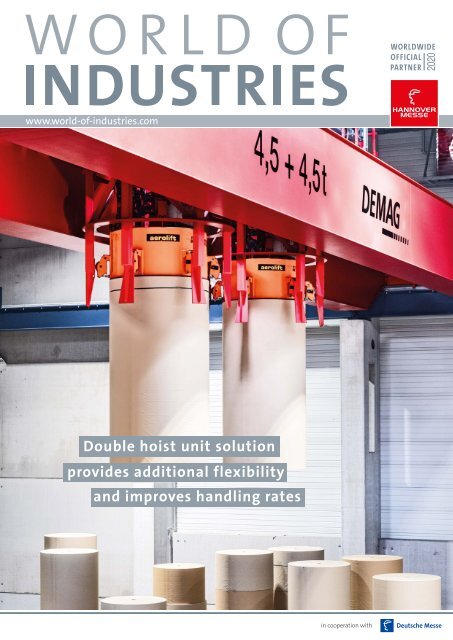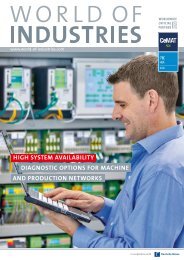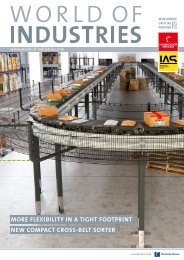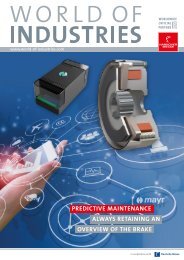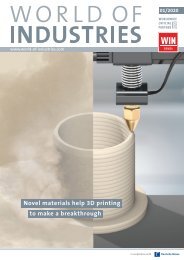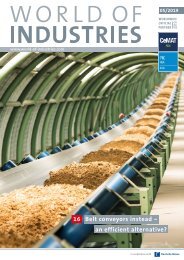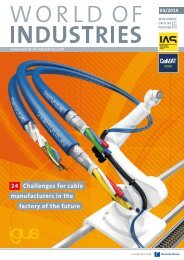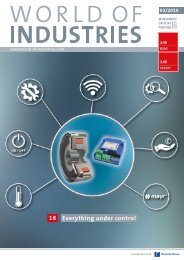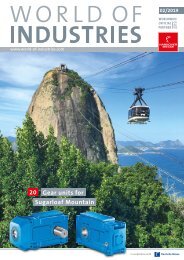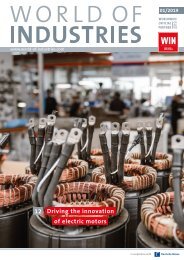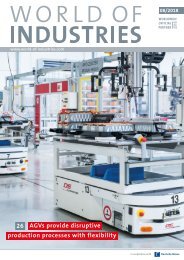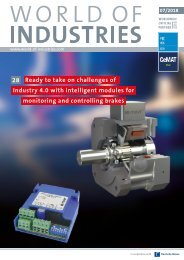WORLD OF INDUSTRIES 2/2020
WORLD OF INDUSTRIES 2/2020
WORLD OF INDUSTRIES 2/2020
You also want an ePaper? Increase the reach of your titles
YUMPU automatically turns print PDFs into web optimized ePapers that Google loves.
www.world-of-industries.com<br />
Double hoist unit solution<br />
provides additional flexibility<br />
and improves handling rates<br />
in cooperation with
SOME THINK<br />
DELIVERY ERRORS<br />
ARE INEVITABLE.<br />
WE THINK<br />
DIFFERENT.<br />
2 <strong>WORLD</strong> <strong>OF</strong> <strong>INDUSTRIES</strong> 2019 1/<strong>2020</strong><br />
beumer.com
EDITORIAL<br />
Digitalization has<br />
long been in everyday<br />
industrial use<br />
Dear readers,<br />
The World of Industries editorial team often wonder what will be the<br />
largest challenge industrial companies face in coming years. As can<br />
be expected, there is currently a lot of uncertainty with regard to the<br />
long-term effects of SARS-CoV-2. However our research and surveys<br />
repeatedly tell us that the effects of the pandemic are not considered a<br />
major challenge for future business, neither is climate change or trade<br />
wars. Instead, managers in industrial companies believe technological<br />
changes in the context of digitalization is the main challenge they<br />
are facing.<br />
The editorial team was rather surprised by these results and believes<br />
they should be considered with a certain amount of skepticism. In<br />
this issue, we will therefore focus on digitalization technologies that<br />
have been successfully implemented in the industrial sector for a long<br />
time: A digital market to supply spare parts, decentralized data<br />
management as part of the Industrial Internet of Things, high-performance<br />
milling machines that are fit for Industry 4.0.<br />
These are just a few examples of a digitalized reality that is already<br />
being implemented. I believe the uncertainty around this subject is<br />
due to the fact that many decision makers have the latent feeling that<br />
digitalization measures in their own company are inadequate and are<br />
never really complete because they are always<br />
focusing on a type of “digitalization standard”.<br />
However, it must be noted that the actual number<br />
of measures is not significant. The deciding factor<br />
is to consider which types of data collection or<br />
networking measures are sensible for your own<br />
company and how large quantities of data are<br />
processed in a productive way.<br />
Let yourself be inspired while reading the<br />
current issue.<br />
Manfred Weber<br />
m.weber@vfmz.de<br />
Editorial board:<br />
Winfried Bauer (Editor-in-chief),<br />
E-mail: w.bauer@vfmz.de<br />
Nicole Steinicke (Editor-in-chief),<br />
E-mail: s.steinicke@vfmz.de<br />
Manfred Weber,<br />
E-mail: m.weber@vfmz.de<br />
Managing editor:<br />
Winfried Bauer<br />
Assistant editors:<br />
Petra Weidt, Melanie Lerch, Angelina Haas,<br />
Ulla Winter, Doris Buchenau<br />
Design/Layout:<br />
Anna Schätzlein, Sonja Daniel,<br />
Anette Fröder, Mario Wüst<br />
E-paper designer:<br />
Anna Schätzlein<br />
Publishing house:<br />
Vereinigte Fachverlage GmbH<br />
Lise-Meitner-Str. 2, 55129 Mainz, Germany<br />
Commercial register No.:<br />
HRB 2270, District Court of Mainz<br />
VAT-ID:<br />
DE149063659<br />
Privacy statement:<br />
ds-vfv.vfmz.de<br />
Managing director:<br />
Dr. Olaf Theisen<br />
Publishing director:<br />
Dr. Michael Werner, E-mail: m.werner@vfmz.de<br />
Correspondent India:<br />
Sushen Haresh Doshi M.Sc.<br />
Advertising sales director:<br />
Beatrice Thomas-Meyer,<br />
E-mail: b.thomas-meyer@vfmz.de<br />
Advertising sales manager:<br />
Oliver Jennen, E-mail: o.jennen@vfmz.de<br />
Andreas Zepig, E-mail: a.zepig@vfmz.de<br />
Sales representatives<br />
Austria:<br />
Heinz-Joachim Greiner,<br />
E-mail: verlagsbuero-greiner@vfmz.de<br />
Denmark, Sweden, Finland, Norway:<br />
Malte Mezger,<br />
E-mail: verlagsbuero-mezger@vfmz.de<br />
France:<br />
Marc Jouanny,<br />
E-mail: marc-jouanny@wanadoo.fr<br />
Great Britain, Ireland:<br />
Rob Brewer,<br />
E-mail: rob.brewer1@btinternet.com<br />
Italy:<br />
Edgar Mäder, E-Mail: publications@emtrad.it<br />
Switzerland:<br />
Hermann Jordi,<br />
E-mail: info@jordipublipress.de<br />
USA, Canada, Mexico:<br />
Patrick Venezia Jr,<br />
E-mail: verlagsbuero-venezia@vfmz.de<br />
Advertising disposition:<br />
Isabell Faß, E-Mail: i.fass@vfmz.de<br />
Brigitte Glückler, E-Mail: b.glueckler@vfmz.de<br />
Nevenka Islamovic, E-mail: n.islamovic@vfmz.de<br />
Heike Rauschkolb, E-mail: h.rauschkolb@vfmz.de<br />
In cooperation with:<br />
Hannover Fairs International GmbH,<br />
Messegelände, 30521 Hannover, Germany<br />
Internet:<br />
www.world-of-industries.com<br />
<strong>WORLD</strong> <strong>OF</strong> <strong>INDUSTRIES</strong> <strong>2020</strong> 3
TABLE <strong>OF</strong> CONTENT<br />
08<br />
14<br />
18<br />
12<br />
10<br />
NEWS AND MARKETS<br />
03 EDITORIAL<br />
05 NEWS AND MARKETS<br />
AUTOMATION<br />
06 DATA MANAGEMENT IN<br />
THE INDUSTRIAL INTERNET<br />
<strong>OF</strong> THINGS<br />
08 SWISS PRECISION PLUS<br />
10 10 CAMERAS TO TEST 10 MILLION<br />
SOCKET COVER PLATES<br />
LOGISTICS<br />
16 COVER STORY DOUBLE HOIST<br />
UNIT SOLUTION PROVIDES<br />
ADDITIONAL FLEXIBILITY AND<br />
IMPROVES HANDLING RATES<br />
18 OPTIMAL SPARE PARTS SUPPLY<br />
MOTION AND DRIVES<br />
12 FOR EFFICIENT MACHINES:<br />
TRIBO-POLYMERS INCREASE<br />
SERVICE LIFE<br />
14 EVERYTHING <strong>OF</strong> A PIECE<br />
COVER<br />
Demag Cranes<br />
& Components,<br />
Wetter, Germany<br />
4 <strong>WORLD</strong> <strong>OF</strong> <strong>INDUSTRIES</strong> <strong>2020</strong>
W RLDWIDE NEWS<br />
New Vice President Sales & Marketing<br />
at TTControl<br />
TTControl, a provider of high-end electronic control systems,<br />
operator interfaces and IoT solutions for mobile machines,<br />
appoints Markus Plankensteiner as Vice President Sales &<br />
Marketing. In this position, he will be responsible to intensify<br />
and expand TTControl’s customer relationships around<br />
controllers, displays and entire machine<br />
architectures, as well as on innovative<br />
industry-specific solutions for<br />
autonomous operation, smart<br />
farming, cloud services and IoT.<br />
Plankensteiner brings in about<br />
20 years of experience in executive<br />
positions in the field of sales and<br />
marketing.<br />
“Markus Plankensteiner is an experienced<br />
manager, who combines a deep<br />
technological understanding with outstanding<br />
sales and marketing expertise,” says Manfred Prammer,<br />
Managing Director at TTControl. “He is well-connected in the<br />
world of mobile machines and a valuable addition to the<br />
existing management and leadership team. His background<br />
and know-how will be highly valuable for TTControl. We’re<br />
thrilled to welcome Markus to the team.”<br />
Phoenix Contact places key<br />
importance on digital quality<br />
Along with product quality, Phoenix<br />
Contact also places high demands<br />
on quality within the digitalization<br />
process. This is evidenced,<br />
for example, by the appointment<br />
of a new Chief Digital<br />
Officer (CDO). The electronic<br />
and automated data<br />
exchange happens using<br />
eCl@ss, the globally<br />
recognized and standardcompliant<br />
standard for<br />
Industry 4.0. eCl@ss enables<br />
the cross-industry standardized<br />
classification and clear<br />
description of products and<br />
services throughout the entire value<br />
chain, often across companies. This<br />
makes it easier for customers to gain an<br />
overview of their processes, such as production.<br />
Working together with business partners is made more efficient.<br />
www.phoenixcontact.com<br />
www.ttcontrol.com<br />
Securing the industry of tomorrow<br />
Iuno, the German national reference project for IT security<br />
in Industry 4.0, returns with a second iteration under the<br />
name of Iuno2Pakt, new goals, and partners to offer a vast<br />
range of solutions meant to counter the cyber challenges<br />
Germany and the global community are facing on the cusp<br />
of the digital industrial revolution. Fraunhofer IOSB,<br />
Hilscher, Weidmueller and Wibu-Systems. Wibu-Systems<br />
has adhered to the consortium with a commitment to<br />
harnessing the power of certificates for safer industrial<br />
communication. Digital certificates provide the most<br />
desperately needed currency in these transactions: trust.<br />
Assigned by a trustworthy Certification Authority, certificates<br />
can act as proof of identity in machine-tomachine<br />
communication and smart<br />
factories, where appli cations,<br />
machines, and business<br />
systems need to be able to<br />
identify and communicate<br />
with each other. Wibu-<br />
Systems is enveloping this<br />
entire process with a novel<br />
addition to its CodeMeter<br />
security and protection<br />
universe: CodeMeter<br />
Certificate Vault.<br />
COVERING THE 4TH INDUSTRIAL REVOLUTION<br />
COVERING THE 4TH INDUSTRIAL REVOLUTION<br />
Discover the<br />
EXCELLENCE <strong>OF</strong> TECHNOLOGY<br />
with a click!<br />
www.world-of-industries.com<br />
www.wibu.com<br />
<strong>WORLD</strong> <strong>OF</strong> <strong>INDUSTRIES</strong> <strong>2020</strong> 5<br />
WIN_EA_Go_Global_2018_01.indd 6 18.09.2018 10:17:36
Data Management in<br />
the Industrial Internet<br />
of Things<br />
AUTOMATION<br />
Industrial Ethernet, the most widely used<br />
communication standard, allows for the simple<br />
connection to control levels while also ensuring good<br />
communication between localised field devices and<br />
the control system. With its new managed switches<br />
in the Advanced Line, Weidmüller is providing a<br />
guaranteed future-proof infrastructure with high<br />
levels of availability, reliability and transparency.<br />
The Advanced Line managed switches can increase network<br />
availability by means of redundancy and control mechanisms,<br />
and also offer a range of diagnostic options for sophisticated<br />
automation networks. They support common protocols such as<br />
STP/RSTP or SNMP and can be intuitively configured via a browsersupported<br />
web interface. With model variants for Fast Ethernet,<br />
Gigabit and PoE as well as versions fitted with between 5 and<br />
24 ports, the switches also ensure high levels of flexibility. The large<br />
temperature range means that the switches can be used in challenging<br />
environments such as production applications or in the<br />
field. The Advanced Line product line ranges from Full Managed<br />
switches for complex applications such as those with port monitoring,<br />
to Lite Managed switches for simple tasks within a network<br />
representing very good value for money.<br />
High level of operational reliability thanks<br />
to quick redundancy mechanisms<br />
Ring redundancy is used as standard in today’s Industrial Ethernet<br />
networks. This ring redundancy method increases the availability of<br />
automation networks and reduces downtimes while also optimising<br />
configurability and operability within the network. The<br />
Weidmüller Advanced Line switches support the combination of<br />
ring and line redundancy, involving the interlinking of multiple<br />
Ethernet switches in a line network. The configuration of the head<br />
switch and the tail switch at the outer ends of the chain incorporates<br />
the two ends into the network. Using the ring and line redundancy<br />
method allows administrators to create redundant topologies<br />
with a high level of flexibility in each network segment. When<br />
The ring redundancy method increases the<br />
availability of automation networks and reduces<br />
downtimes while also optimising configurability<br />
and operability within the network<br />
using the Weidmüller Advanced Line switches, a back-up path is<br />
created if one of the network segments fails, meaning that the<br />
network is restored in just 30 ms in a setup with up to 250 switches.<br />
This increases network availability while reducing cost-intensive<br />
downtimes.<br />
Easy to integrate into different automation<br />
landscapes<br />
The Advanced Line switches support common protocols such as<br />
STP, RSTP or SNMP, making them particularly easy to integrate into<br />
different automation landscapes. The web-based configuration of<br />
the Advanced Line switches is performed using a simple and intuitive<br />
user interface. As a result, users are able to benefit from direct<br />
access to all status information and operational functions of the<br />
switches within their familiar software environment.<br />
6 <strong>WORLD</strong> <strong>OF</strong> <strong>INDUSTRIES</strong> <strong>2020</strong>
Weidmüller also offers an external Backup and Restore module for<br />
smooth operation even in the event of errors. This module provides<br />
a backup of the device configuration, making sure that reconfiguration<br />
can be performed directly on the device if required. This means<br />
that the configuration can be backed up without a network or a<br />
computer. A replacement device can therefore be put back into<br />
operation directly on site.<br />
A high level of flexibility<br />
Model variants for Fast Ethernet, Gigabit and PoE (Power over<br />
Ethernet – for the remote supply of the periphery) as well as the<br />
options to have between 5 and 24 ports ensure a high level of flexibility,<br />
meaning that there is the perfect device for every application.<br />
Partner in industrial connectivity<br />
As experienced experts we support our customers and<br />
partners around the world with products, solutions and<br />
services in the industrial environment of power, signal and<br />
data. We are at home in their industries and markets and<br />
know the technological challenges of tomorrow. We are<br />
therefore continuously developing innovative, sustainable<br />
and useful solutions for their individual needs. Together we<br />
set standards in Industrial Connectivity. The Weidmüller<br />
Group owns manufacturing plants, sales companies and<br />
representatives in more than 80 countries.<br />
All Ethernet switches have an industrial IP30 metal enclosure with<br />
integrated clip-in base for easy installation on the terminal rail<br />
(TS35). In addition to its simple installation, the switch is also characterised<br />
by its large temperature range. The switches can be used<br />
in environments from –40 to +75 °C. This allows for operation both<br />
within production and in the field.<br />
The right solution for every application<br />
Depending on the particular version, the switches are fitted with a<br />
number of combinable copper or fibre-optic interfaces, meaning that<br />
different media can be used and large distances covered. Whether<br />
multi-mode or single-mode, 500 metre or anywhere up to 20 km – the<br />
SFP slots help to guarantee flexible use. With the modular port assembly,<br />
the transceiver simply needs to be plugged in. It is therefore<br />
also possible to change the technology at a later point in time.<br />
For simple or complex tasks<br />
The Advanced Line switches are available in the “Full Managed”<br />
and “Lite Managed” versions. The Full Managed switches are particularly<br />
well-suited for use in networks with complex tasks and<br />
particular requirements regarding redundancy, secured data transfer<br />
or the monitoring of individual ports. The Lite Managed switches<br />
are the economical alternative for simple tasks in networks with<br />
little demand for managed processes.<br />
Photos: Lead stock.adobe.com/elenabsl, product image Weidmueller<br />
www.weidmueller.com<br />
smart plastics<br />
Avoid unplanned downtime<br />
Industry 4.0: smart plastics eliminate downtimes<br />
Intelligent products give a maintenance alert ahead of time and can be integrated into<br />
standard predicitve maintenance; smart plastics allow your equipment to run continously<br />
as well as reducing maintenance costs.<br />
Video "Industry 4.0 - predictive maintenance" at igus.eu/smartplastics<br />
plastics for longer life ®<br />
Tel. +49-2203-9649-800 info@igus.eu<br />
EU-1131-smart plastics 185x130.indd 1 10.03.20 08:57<br />
<strong>WORLD</strong> <strong>OF</strong> <strong>INDUSTRIES</strong> <strong>2020</strong> 7
Rotary tilting table on<br />
the milling center<br />
Swiss Precision Plus<br />
The Swiss maker GF Machining Solutions has equipped its 5-axis high-performance<br />
machining centers with the versatile IO-Link communication interface. Users will now<br />
profit from simpler handling as well as never before availability of process data for<br />
configuration, diagnostic and service purposes.<br />
Author: Wolfgang Zosel,<br />
freelance industry journalist,<br />
Reutlingen, Germany<br />
AUTOMATION<br />
The IO-Link technology is a communication system for connecting<br />
intelligent sensors and actuators to an automation system.<br />
In addition to simple handling, this also shortens the installation<br />
and start-up phase and makes it easier to meet individual customer<br />
requirements for cables and tool management. For this reason, the<br />
Swiss manufacturer GF Machining Solutions (GFMS) has equipped<br />
its 5-axis high-performance machining centers with the versatile<br />
IO-Link communication interface. The new Mikron MILL P 500 U<br />
thus meets the highest precision requirements and IO-Link has established<br />
itself at GFML as a real push technology for digitized and<br />
networked system concepts.<br />
Highest precision with accuracies<br />
of +/- 2 micrometers<br />
Stefan Fahrni, Milling Product Manager, puts in a nutshell what<br />
customers appreciate about GFMS machining centers: “With accuracies<br />
of +/- 2 micrometers we meet the requirements for the highest<br />
precision and consistently high quality. In order to ensure thermal<br />
stability, the machine bed is made of an especially heavy duty<br />
mineral casting. We use water-cooled components to ensure that<br />
heat sources cannot have an effect on the customer’s product.” As a<br />
member of GF Machining Solutions, Mikron Agie Charmilles AG<br />
with headquarters in Nidau near Biel is a globally active manufacturer<br />
of machines, automation solutions for mold and tool making<br />
as well as for the manufacturing of precision parts.<br />
The new Mill P 500 U is a 5-axis high performance machine for both<br />
precision part manufacturers active in the aerospace, machinery<br />
and defense industries, general mechanic industries and precision<br />
mold makers active in industries such as automotive and home appliance.<br />
The core of the machine is a base module for top or front<br />
loading. Depending on the customer requirement either partly or<br />
fully automated feed mechanisms as well as differently dimensioned<br />
tool magazines are available.<br />
The “Integral Connectivity 4” project<br />
The first stages of development of the Mill P 500 U go back several<br />
years. Most of the focus was on what customer requirements would<br />
look like in the future. Long before the term Industry 4.0 became an<br />
IO-Link by Balluff makes high-performance<br />
milling machine ready for Industry 4.0<br />
electrifying metaphor for an entire sector, the developers at GFMS<br />
had recognized the significance of increasing digitization and networking<br />
including the associated opportunities. “In addition to<br />
simple position values, intelligent sensors today offer a variety of<br />
process data right where the action is taking place. The question is<br />
8 <strong>WORLD</strong> <strong>OF</strong> <strong>INDUSTRIES</strong> <strong>2020</strong>
how to use this in an uncomplicated and efficient<br />
way for process optimization. What changes with respect<br />
to equipment handling? How does the customer<br />
benefit, what changes for us as a manufacturer,”<br />
summarizes Konrad Meier, Head of<br />
Electronic Design.<br />
This was a reason for the company in 2014<br />
to create the “Integral Connectivity 4”<br />
project: GF Machining Solutions used<br />
this to pursue the goal of implementing<br />
more functional security in the<br />
controller, modular electronic concepts with<br />
decentralized linking of the peripherals, as<br />
well as a simple, thorough communication<br />
solution between the command level and the<br />
sensor/actuator level. No more cumbersome<br />
multi-pin wiring; the installation, assembly and maintenance<br />
effort was to be drastically reduced and the diagnostic capability<br />
increased.<br />
01 Mill P 500 U highperformance<br />
milling center with its<br />
versatile and simply programmable<br />
IO-Link SmartLight stack light<br />
02 8 x ProfiNet/IO-Link master<br />
and IO-Link sensor/actuator hub<br />
from Balluff (right); the cables are<br />
installed via plug-and-play without<br />
the need for tools<br />
Development of an integrated IO-Link concept<br />
“In spring of 2014 we had an opportunity to present the IO-Link<br />
communication standard, which at that time was hardly known at<br />
GF Machining Solutions. Two of the engineers quickly recognized<br />
that this bidirectional interface would provide answers to a variety<br />
of questions. A short time later we got the order to work with GF<br />
Machining Solutions to develop an integrated IO-Link concept for<br />
the planned Mill P 500,” recalls Thomas Zumbrunn, sales engineer<br />
with the Swiss Balluff subsidiary. As a globally standardized IO<br />
standard (IEC 61131-9) IO-Link enables uncomplicated data exchange<br />
between sensors/actuators and the master/control level -<br />
using just the familiar standard 3-conductor cable and M12 connector!<br />
This efficient point-to-point connection is not a fieldbus,<br />
but rather a logical continuation of the previous connection technology<br />
for sensors and actuators.<br />
In addition to many different sensors for position and object detection,<br />
valve terminals and pressure sensors on the rotary index<br />
table including RFID tool management, the Mill P 500 U with its<br />
various feed mechanisms organizes dozens of signals. IO-Link is<br />
in contact with the Siemens and Heidenhain controllers in the<br />
system via Profinet IO-Link masters. “IO-Link offers a previously<br />
unknown simplification from the conception to the installation<br />
and commissioning phase thanks to its standardization. Installation<br />
with IO-Link means error-free plug-in instead of error-prone<br />
wiring. Shielded special cables and expensive plug-in cards are<br />
passé, drag chains undergo drastic reduction, and equipment<br />
with IO-Link guarantees high EMC stability.<br />
Advantages of IO-Link in use<br />
IO-Link really shows its strengths in customer application: a simple<br />
to use central recipe management system allows users to reconfigure<br />
entire sensor groups in seconds from the master or controller<br />
level. The threshold value of a pressure sensor is no longer set on<br />
the device, but rather centrally by the master or from the HMI. Replacing<br />
a defective sensor no longer involves a long system stoppage:<br />
just a few seconds after plugging in the cable the device receives<br />
its relevant values from the central location and resumes its<br />
intended task.<br />
Intelligent sensors are able to transmit a wealth of parameter and<br />
status data in real time, thus creating a comprehensive picture of<br />
the status of things on the process level. This opens up new diagnostic<br />
and predictive maintenance approaches: the milling tool<br />
equipped with an RFID chip sends its specific product and use data<br />
03 Valve terminal plugs connect decentralized valve terminals to the<br />
control level via IO-Link<br />
to the controller and prompts a sharpening date ahead of time.<br />
When a lens gets dirty a photoelectric sensor sends a notification<br />
that performance is being degraded and prompts intervention. A<br />
drive tells the system that a defined temperature limit has been<br />
exceeded. Service and maintenance actions are possible remotely<br />
down to the sensor/actuator level while meeting the operator’s<br />
safety specifications.<br />
Easily visualize every conceivable status<br />
Part of the IO-Link portfolio equipping the new Mill P 500 U is the<br />
SmartLight from Balluff: the IO-Link stack light is freely and easily<br />
programmable, with options for stack light, level, run light and flexi<br />
modes with a broad color spectrum range. “This allows us to easily<br />
visualize every conceivable status, warning message or prompt for<br />
action. And mainly we only need to stock a single, universally<br />
adaptable light type,” emphasizes Konrad Meier.<br />
By using IO-Link GF Machining Solutions and Balluff have shown<br />
that an amazingly simple technology can further refine an essentially<br />
highly precise and reliable process. “Balluff was not just a<br />
parts supplier, but rather a valuable consultant and equal level<br />
project partner. Which is why “IO-Link by Balluff” will be a fixed<br />
part of our offering in the future as well,” summarizes Stefan Fahrni.<br />
Photos: Balluff<br />
www.balluff.com<br />
<strong>WORLD</strong> <strong>OF</strong> <strong>INDUSTRIES</strong> <strong>2020</strong> 9
10 cameras to test<br />
millions of socket cover plates<br />
How do you carry out quality inspections on ten million plastic parts per year? Until<br />
recently this was done manually, but now it has become an automated process thanks<br />
to the smart inspection system by Aumo. The automation specialist relies on ten<br />
Baumer CX cameras working as the “eyes” of the machine.<br />
Author: Nicole Marofsky,<br />
Marketing Communication<br />
at Vision Competence Center<br />
by Baumer<br />
AUTOMATION<br />
It all starts with a blank sheet of paper. Next, the customer outlines<br />
what is needed; a quality inspection system, an automated assembly<br />
machine, or any other specific installation. The Aumo engineers<br />
elaborate on a concept and design and at the end of the<br />
process is the final all-in package, including system, servicing, commissioning<br />
and maintenance. “We only build individual solutions,”<br />
says Ben Rösler, project and sales manager and son of René Rösler,<br />
who founded the company in its present form in 1990, and has been<br />
the CEO ever since. Their main customers are in the automotive<br />
and supplier industry, aerospace, and plastics processing but also<br />
can be found in mechanical engineering, medical technology, and<br />
the semiconductor industry.<br />
Simple parts, yet complex inspection<br />
SchoPlast, a German state-owned company in the early 1970s and<br />
re-founded in 1992, delivers decades of experience. Being a wellestablished<br />
manufacturer of mainly thermosetting plastic parts for<br />
electrical installations, they asked Aumo to develop a quality in-<br />
spection system for socket plates. Dozens of them can be found in<br />
everybody’s home today. The socket cover, attached fully visible<br />
outside the wall, is manufactured in large quantities and must undergo<br />
complex inspection, since the premium customer SchoPlast<br />
has extraordinarily high demands on quality. Quality requirements<br />
refer to dimensions and precise outer contours. Identifying even<br />
the smallest defects such as scratches and surface imperfections is<br />
particularly demanding. SchoPlast produces ten million socket<br />
plates per year, with all-manual inspection so far – a giant effort,<br />
which was the spark that got things moving to take the load off the<br />
people and automate the task. So SchoPlast approached Aumo to<br />
learn if they could make it an automated process.<br />
Change into an automated process<br />
Aumo could. Within the system than has been in operation at Scho-<br />
Plast since April 2018, two socket plates per cycle are picked from<br />
the bin and placed next to each other on a complex conveying system.<br />
In the next step, the plates pass several inspection stations. All<br />
10 <strong>WORLD</strong> <strong>OF</strong> <strong>INDUSTRIES</strong> <strong>2020</strong>
The background image shows the second test box which hosts the<br />
angularly arranged cameras and illumination system. Any irregularities<br />
on the plate surface are revealed by the cast shadow. The product image<br />
shows the CX series cameras with GigE, USB 3.0 and cutting-edge Global<br />
and Rolling Shutter CMOS sensors for cross-industry applications<br />
inspections tasks are image-based, except for two tactile operations<br />
to measure material thickness and so-called pot size. To do so, there<br />
are four measuring boxes hosting ten cameras in total and illumination<br />
units with ring lights as incident or transmitted light for surface<br />
illumination. Passing the boxes, the cover plates are automatically<br />
turned and positioned for backside inspection. As the final step in<br />
the inspection process, the socket plates are sorted according to<br />
good parts or defect type.<br />
Open system architecture preferred<br />
The ten Baumer cameras are integral to this successful automation<br />
solution. In which way? The first benefit is quite unspectacular:<br />
From the Baumer Vision Competence Center to Aumo, it’s only 25<br />
minutes by car. Baumer has been using Aumo profile systems and<br />
components for the design of production and inspection stations,<br />
so they have known and trusted each other. But that is only half of<br />
the story. “We were looking for an open system with standardized<br />
lens connection and data interface to output gray images,” says<br />
Rösler. “Other manufacturers only offered complete systems which<br />
we found insufficient in terms of flexibility.”<br />
The Baumer camera VCXU-53M with USB 3.0, lens connection<br />
35 mm and 1.4 aperture was the perfect match. Integrating ON<br />
Semiconductor Python 5.3 Megapixel Global Shutter sensors, the<br />
cameras deliver excellent image quality with up to 73 fps. In the<br />
SchoPlast application, the cameras acquire an image every 3.67<br />
seconds at exposure times between 0.125 and 0.5 milliseconds. The<br />
camera data are delivered to two industrial PCs, which in parallel<br />
control illumination. The computers run specific Aumo-developed<br />
evaluation software. The results directly enter the SchoPlast quality<br />
management system. Results can be retrieved even years later for<br />
reasons of traceability in the event of frequent error occurrence at<br />
later points in time.<br />
Aumo does not only use the Baumer VCXU-53M cameras for the<br />
SchoPlast inspection application. Baumer cameras do their jobs –<br />
contour inspections on objects – in two more applications at other<br />
customers. “We chose this camera because it has exactly what we<br />
need,” says Rösler.<br />
Temperature under control<br />
Among other features, the cameras have excellent temperature<br />
management capabilities. Prior to commissioning, there was concern<br />
about the cameras heating up too much and probably exceeding<br />
the maximum permissible operating temperature of 65 °C when<br />
being exposed to the “flash light inferno” inside the measuring<br />
boxes. However, the all-clear was given by the diagnostics of the<br />
continuously transmitted operating data of each camera. The maximum<br />
temperature reached was 56 °C. This eliminates the need for<br />
active cooling, which would have made the system even more complex<br />
and expensive.<br />
“The SchoPlast project manager was very pleased and astonished<br />
by our clever solution,” says Rösler, and solves the secret behind it:<br />
“We don’t just want to sell our solution; we always look at the customer’s<br />
requirements from his point of view”.<br />
Photos: Background Aumo, product image Baumer<br />
www.baumer.com<br />
MY INVERTER<br />
IS FROM NORD!<br />
THE NEW NORDAC PRO<br />
Integrated multi-protocol<br />
Ethernet interface<br />
Multi-encoder interface<br />
for multiple axis operation<br />
Mains voltage-free<br />
parameterisation via USB port<br />
GEAR UNIT + MOTOR + DRIVE ELECTRONIC = DER ANTRIEB.<br />
Getriebebau NORD GmbH & Co. KG | Fon +49 4532 289-0 | info@nord.com<br />
<strong>WORLD</strong> <strong>OF</strong> <strong>INDUSTRIES</strong> <strong>2020</strong> 11<br />
www.nord.com
Igus offers a large selection<br />
of self-lubricating polymer<br />
plain bearings<br />
For efficient machines:<br />
tribo-polymers increase service life<br />
MOTION AND DRIVES<br />
Tribo-polymers from igus display their advantages in<br />
maintenance-free and lubrication-free iglidur bearing<br />
technology.<br />
Anyone who wants to be relaxed about a future with Industry 4.0<br />
goes a long way towards getting things right by keeping a close<br />
eye on costs. A consideration of service life must take account of all<br />
those costs that are incurred over the long term, in addition to the<br />
costs of purchase, procurement and installation of a machine. Operation,<br />
maintenance and repair are examples of what can lead to<br />
such costs. The use of wear-resistant materials and low-maintenance<br />
components reduces not only costs but also the risk of unscheduled<br />
shutdowns and extensive maintenance work. Motion<br />
plastics specialist igus has many years of experience and knowledge<br />
in the development and production of wear-resistant solutions<br />
made of tribo-polymers, and also keeps a large database in its own<br />
test laboratory – all of which makes the company the ideal supplier<br />
for mechanical engineers. The reason is that machines today are often<br />
utilised all day long in three shifts. In the light of the growing<br />
challenges, searching for the tribologically optimised component is<br />
time well spent for every mechanical engineer.<br />
The combination is the secret<br />
Design engineers know all about looking for and finding the right<br />
material. Users often find that the best tribologically optimised<br />
component for them is to be obtained from the Cologne-based<br />
plastics specialist. This is because igus develops polymers specifically<br />
for dry operation. Use is made of base polymers, solid lubricants<br />
and, last but not least, strengtheners in order to develop even<br />
better materials for increasingly challenging applications and to<br />
achieve better wear results.<br />
Continuous development based on experience<br />
Whereas some of these materials are developed specifically on behalf<br />
of individual customers who indicate special requirements,<br />
others become part of the catalogue portfolio. In more than 12,000<br />
wear tests per year on over 450 test stands, the engineers from igus<br />
analyse wear behaviour systematically. In this context, more than<br />
135 trillion test movements take place. The large number of tests is<br />
due to the different ambient conditions that are considered, such as<br />
temperature, humidity, the type of movement and the contact materials.<br />
All these factors have an effect on the wear patterns in the<br />
individual scenarios and have to be taken into account. The analysis<br />
is used not only to evaluate the materials generally but also to create<br />
the basis for a service that is unique throughout the industry: namely,<br />
calculation of the service life of components in any application.<br />
The test laboratory as a reflection of<br />
industrial reality<br />
This large number of parameters alone, shows how much work is<br />
involved in the acquisition of research results that are essential for<br />
12 <strong>WORLD</strong> <strong>OF</strong> <strong>INDUSTRIES</strong> <strong>2020</strong>
the successful development of high-strength polymer components.<br />
This is why plastics specialist igus operates a test laboratory covering<br />
an area of 3,800 square metres. The tribological quality of the<br />
polymers is tested here with linear, rotating and flexing types of motion<br />
as well as in combination with other materials. But it is not just<br />
the mechanical properties that are important for the generation of<br />
relevant information and the continuous improvement of customer<br />
solutions; igus components are used in different branches of industry<br />
and, accordingly, must be able to withstand different external<br />
influences. Examples of the latter are, on the one hand, classical<br />
manufacturing equipment and methods involving a normal degree<br />
of dirt and, on the other, extremely dirty environments or the presence<br />
of aggressive chemicals. This is the case when components<br />
made of tribo-polymers are used in the area of agriculture, the<br />
building industry or offshore installations. Other branches, other<br />
challenges. And this is exactly why the tests in the igus laboratory<br />
are so important.<br />
Diverse influences have an effect on the<br />
polymer products<br />
In meadows and fields there is always a lot of dust, while ambient<br />
conditions tend to be aggressive in the building materials industry<br />
due to chemicals or in the offshore area due to salt water. Components<br />
that are used in cleanrooms of the pharmaceutical industry<br />
or in environments where they come into contact with food have to<br />
cope with other conditions. Here, hygienic design is of utmost importance.<br />
In the igus laboratory, the engineers are very well prepared<br />
for all the challenges they encounter, from tests underwater<br />
to the simulation of very dirty environments. Of course, such a large<br />
variety of test environments also includes the use of different temperatures<br />
and tests in a cold chamber. All this has resulted in products<br />
such as iglidur plain bearings, drylin linear bearings, xiros ball<br />
bearings, energy chains and cables whose polymers have the best<br />
tribological properties for almost any application.<br />
A continually growing database<br />
Year after year, the laboratory’s test databases are supplemented<br />
with more research data on the basis of which new materials are<br />
created, whose technical performance today is already at the level<br />
of what customers will not be looking for until tomorrow. Just how<br />
closely and effectively the igus engineers focus on the future is also<br />
shown by the fact that, thanks to the huge amount of recorded test<br />
data, the service life of a product can be calculated in an expert system<br />
specially developed for this purpose. This service, which is<br />
unique throughout the industry, is a significant benefit for the customer,<br />
especially when it comes to bearing technology products<br />
that are of central importance for the operational readiness of machines<br />
and installations. What is also important is that the consequences<br />
of a bad choice of material can be devastating.<br />
Tribologically optimised polymers ensuring<br />
the smooth operation of bearings<br />
Anyone who wants a safe and reliable production process on a large<br />
scale should first think of the small things, namely the bearing. This<br />
component should be as wear-resistant as possible so that everything<br />
operates smoothly and also for a long time. There are many<br />
different types of bearing such as rolling bearings, linear bearings<br />
and plain bearings. The latter are supplied by igus as lubricationfree<br />
polymer bearings. A product range with over 8,500 catalogue<br />
dimensions and specialist parts according to customer specifications<br />
made of more than 60 different tribologically optimised materials<br />
offers the user a wide range of choices. Simply the fact that no<br />
lubrication is needed reduces the customer’s costs. Maintenance<br />
work is also reduced. igus polymers are corrosion-free and even<br />
able to withstand high loads. In addition to the classical plain bearings,<br />
igus supplies a wide range of polymer slewing ring bearings<br />
(iglidur PRT). Last but not least, the tribologically optimised xiros<br />
polymer ball bearings are the result of intensive research. In many<br />
places today, they are the first choice of mechanical engineers for<br />
whom classical ball bearings made of metal are inadequate. For<br />
customers who are looking for more freedom in the design of lubrication-free<br />
spherical bearings, it is worthwhile looking at the igubal<br />
series of bearings. The complete system of self-adjusting bearing<br />
elements has the best tribological properties and consists of a wide<br />
range of swivel heads, clevis joints, flange bearings, spherical bearings<br />
and pillow block bearings.<br />
Tribo-polymers: a good option for<br />
do-it-yourselfers as well<br />
Customers who love creating as much as they do freedom, can obtain<br />
iglidur sold by the metre, which is a type of bar stock that offers<br />
many possibilities of design. iglidur bar stock is a good choice for<br />
the creation of test samples, very small series and, last but not least,<br />
complicated prototypes, which often entail searching for the right<br />
material.<br />
Where durability is more of a concern than design, the tribological<br />
properties of lead screw systems, trapezoidal threads or high<br />
helix threads from igus are more important. This is because the<br />
functioning of such products and therefore process reliability, depends<br />
on an abrasion-resistant surface structure. In the drylin series,<br />
mechanical engineers can find polymer solutions that do their<br />
job reliably and without fault, even under very stressful conditions.<br />
igus is able to say this for each of its products because of the tests it<br />
carries out in its own laboratory. Today, tomorrow, the day after<br />
tomorrow and even the day after that.<br />
Photos: igus<br />
www.igus.de<br />
01 Igus engages in<br />
research and continually<br />
develops new tribocompounds<br />
01 02<br />
02 The origin of every<br />
motion plastics product:<br />
igus tribologically<br />
optimised polymers<br />
<strong>WORLD</strong> <strong>OF</strong> <strong>INDUSTRIES</strong> <strong>2020</strong> 13
Everything<br />
of a piece<br />
MOTION AND DRIVES<br />
Whether it’s a gearbox or crankcase, structural<br />
components such as A-pillars or doors and tailgates:<br />
when it comes to aluminum die-casting, numerous<br />
well-known automobile manufacturers rely on the<br />
moulds produced by toolmaking specialist<br />
Heck+Becker. Sophisticated temperature management<br />
ensures the outstanding precision of the cast parts<br />
– and requires a large number of hose lines.<br />
The aluminum alloy is heated to temperatures of up to 700 °C and<br />
can be poured into the man-sized mould at speeds of up to<br />
5 m/s. The molten metal is then post-compacted at up to 1,000 bar.<br />
The mould filling process is completed in a few milliseconds and<br />
then the solidification of the component begins. This can produce a<br />
gearbox housing with a highly complex structure in a very short<br />
time. During the entire casting process a hydraulically generated<br />
clamping force of over 3,000 t ensures that both halves of the mould<br />
fit accurately together. The mould is opened hydraulically and a robot<br />
removes the completely solidified casting. A second robot cools<br />
the mould with a water-based release agent and prepares it for the<br />
next part to be cast. The casting process is repeated fully automatically<br />
every 90 seconds. And that 7 days a week, 24 hours a day.<br />
It’s all a question of temperature<br />
But how does the company achieve this outstanding precision in<br />
die-casting, which in addition to reproducing intricate details, also<br />
allows the forming of drill holes into which only the thread has to be<br />
14 <strong>WORLD</strong> <strong>OF</strong> <strong>INDUSTRIES</strong> <strong>2020</strong>
01 Up to 200 m of hose in different sizes can be installed on a single<br />
mould<br />
02 In addition to supplying complete workshop equipment, Hansa-Flex<br />
supports the mould specialist by offering appropriate training in hose<br />
production<br />
cut later? “An optimum result requires optimum temperature control<br />
of the casting mould”, explains Ralf Fett, Production Manager at<br />
Heck+Becker GmbH. This is because the temperature conditions in<br />
the mould have to be managed in such a way that it can be completely<br />
filled without the aluminium already beginning to solidify<br />
during the filling process. A regulated heating and cooling circuit<br />
ensures that the required temperature is maintained in each area of<br />
the mould throughout the entire casting process. Depending on the<br />
application, oil and water are used for heating or cooling. The media<br />
flow through hose lines that connect the numerous inputs and<br />
outputs of the mould to the temperature control units.<br />
Engineering meets experience<br />
Heck+Becker develops the moulds in close cooperation with its<br />
customers. The moulds are constructed virtually using a 3D CAD<br />
model. The temperature conditions within the mould are also calculated<br />
and simulated in advance on the model. “The question of<br />
where and how to heat and where and how to cool can’t, however,<br />
be answered conclusively in theory. There are simply too many different<br />
parameters involved,” reports Fett. The optimisation of the<br />
mould also takes place in practical operations. First the shape is<br />
milled from a specially alloyed hardened tool steel on the basis of<br />
the design data and using CNC technology. Next the patterning –<br />
i.e. the test castings – takes place, for which Heck+Becker has its<br />
own fully automated casting cell. The cast components are then<br />
precisely measured and compared with the strict quality specifications<br />
of the customer. “Even the slightest changes to the temperature<br />
controls can have a noticeable effect. However, a mathematical<br />
model is no longer the answer here – on the contrary, what is required<br />
at this stage is simply our many years of experience,” says<br />
Fett in summing up the challenge.<br />
Hose lines manufactured in-house<br />
Changes to the temperature controls often require adjustments to<br />
the hose lines of the heating and cooling circuit. Heck+Becker manufactures<br />
these hose lines itself, together with the hydraulic lines<br />
and the supply for the water-wax mixture used as a separating<br />
agent, in the process relying on HANSA-FLEX components: “Long<br />
service life is a matter of course for us and our customers. Due to the<br />
media used as well as the high temperatures and pressures, we<br />
can’t afford any compromises in terms of quality,” reports Ullrich<br />
Graul, who is in charge of moulded tubing. Heck+Becker relies almost<br />
throughout on multiple reinforced Teflon hoses. And there is<br />
no shortage of these, because up to 200 m of hose in different sizes<br />
can be installed on a single mould. In addition to supplying<br />
complete workshop equipment, HANSA-FLEX supports the mould<br />
specialist by offering appropriate training in hose production.<br />
Right on the spot<br />
The close proximity to the HANSA-FLEX branch – only a few hundred<br />
metres separate the two companies in Dautphetal, Germany<br />
– enables Heck+Becker to dispense with extensive stock keeping. “It<br />
is often only directly at the mould that it becomes clear what diameter<br />
will enable the right heating conditions. We really appreciate<br />
the fact that we can obtain what we need quickly,” explains Graul.<br />
The branch itself ensures continuous supply capability: “It’s not uncommon<br />
for us to take delivery of 5,000 m of hoses in a single day,”<br />
says Dennis Heinold, a member of the depot team. However, the<br />
cooperation is not limited to the supply of materials: “Together we<br />
discuss what customer-specific requirements we can best cover<br />
with what material”.<br />
Fast support<br />
In addition to manufacturing, Heck+Becker also carries out the<br />
maintenance and repair of die-casting moulds for many of its customers.<br />
When order backlogs develop due to predetermined time<br />
windows, the mould specialist falls back on HANSA-FLEX’s Rapid<br />
Hydraulic Service. “We are supported around the clock not only in<br />
mould making, but also in the maintenance of our own production<br />
machinery,” sums up Fett. “Whether it’s material procurement,<br />
consulting or on-site deployment: we benefit in a number of ways<br />
from the uncomplicated cooperation between our companies”<br />
www.hansa-flex.com<br />
<strong>WORLD</strong> <strong>OF</strong> <strong>INDUSTRIES</strong> <strong>2020</strong> 15
Double hoist unit solution provides<br />
additional flexibility and improves<br />
handling rates<br />
LOGISTICS<br />
The paper industry is a key sector for process crane<br />
technology. The corresponding cranes and hoists have<br />
to perform a wide range of tasks, from precise<br />
positioning of paper machine rollers to fully<br />
automated stores for paper rolls. Laakirchen Papier AG<br />
is a good example of the potential that can be<br />
achieved.<br />
Laakirchen Papier AG is an important part of the local economy<br />
in the Laakirchen municipality in Upper Austria. As part of the<br />
Heinzel Group, the company produces paper for packing and publication<br />
purposes on the two PM 10 and PM 11 paper machines at<br />
this location. Following the conversion and modernisation work,<br />
paper machine PM 10 specialises in the production of lightweight<br />
corrugated base paper made from waste paper for environmentally<br />
friendly packaging solutions. This provides a not inconsiderable<br />
increase in its production capacity. At the same time, the company<br />
has extended its production capacity for SC paper used for magazines,<br />
catalogues and printed advertising material on paper machine<br />
PM 11. The resulting investment in a new paper-roll shipping<br />
store is an important part of the growth strategy pursued by Heinzel<br />
Group, which has set itself the goal of becoming the most competitive<br />
and eco-friendly paper factory in Europe.<br />
Loading times cut by 30 per cent<br />
Two process cranes (33 m spans) supplied by Demag handle the<br />
rolls of paper in the shipping store. The store can accommodate<br />
some 8,870 tons of paper when filled to a capacity of 80 per cent.<br />
The store is filled around the clock in 24/7 operation. Besides the<br />
limited area for storage of the paper rolls, the loading times, which<br />
are limited to five working days, also posed a challenge. Particularly<br />
at the beginning of the week, when the roll store is largely full, the<br />
trucks that collect the product need to be served very quickly. “To<br />
clear the order peaks in the paper store, we initially placed emphasis<br />
on reducing the number of crane travel operations. This was<br />
achieved by installing two crabs on each crane”, explains Markus<br />
Otto, Demag Process Cranes Sales Director.<br />
The open winch units are equipped with vacuum lifting devices,<br />
which can be used to store and retrieve the unpacked rolls of paper<br />
16 <strong>WORLD</strong> <strong>OF</strong> <strong>INDUSTRIES</strong> <strong>2020</strong>
The concept with two process cranes<br />
operating on one crane runway, each<br />
fitted with two open winch crabs that can<br />
travel independently of each other,<br />
is an example of Demag expertise<br />
Winfried Bauer, editor-in-chief<br />
World of Industries<br />
quickly and, above all, gently. Each crane is designed in such a way<br />
that it can handle rolls with a maximum diameter of 1,500 mm,<br />
widths up to 3,300 mm and a maximum weight of 4,5 tons in pairs or<br />
individually. Using the new technology, the system can perform 104<br />
roll-handling movements per hour. Otto explains: “These performance<br />
figures were also achieved by combining the fast travel and<br />
lifting speeds of our process cranes with this double-crab solution.”<br />
The cranes, which feature dual channels for all safety-relevant<br />
features, are precisely positioned at the points specified by the<br />
warehouse management system by means of laser position measuring<br />
systems. The vacuum lifting device needs less than a second to<br />
connect to the rolls of paper by suction. Lifting and lowering speeds<br />
of up to 78 m/min are achieved with a load and 120 m/min without<br />
a load. The cranes place the paper roll products in dedicated stacks<br />
measuring up to 15,05 m in height in an area measuring 2,700 m².<br />
“With our new fully automated crane store, we can load approx. five<br />
trucks per hour. Compared to a manually controlled store, we have<br />
cut loading times by some 30 per cent”, explains Dr. Thomas Welt,<br />
CEO of Laakirchen Papier AG.<br />
The Demag warehouse management system also contributes significantly<br />
towards system performance. “The software can flexibly<br />
assign the travel areas to both of the cranes, optimises utilisation of<br />
the storage locations and prepares any scheduled retrieval operations”,<br />
explains Gerhard Lange, Demag Senior Project Manager Process<br />
Cranes for the paper industry.<br />
The two process cranes utilise benefits for handling rolls and for<br />
power consumption: electric power generated during the lowering<br />
and braking operations is fed back into the power supply by power<br />
recovery units. In this way, the company’s energy footprint is further<br />
improved.<br />
Co-operation going forward<br />
The investments in the paper machines and cranes have paid off<br />
for the customer. During a visit to the site, work on a third area of<br />
the paper roll shipping store was well underway. The additional capacity<br />
is also urgently needed because the operating speeds of<br />
PM 10 and PM 11 are to be gradually increased to 1,600 and<br />
1,800 m/min, respectively. Since both process cranes were specified<br />
for future requirements, the additional loads will be no problem<br />
for the installations. <br />
WB<br />
Photos: Demag, f+h<br />
www.demagcranes.com<br />
ROBA ® -brake-checker:<br />
Intelligent safety<br />
Permanent brake monitoring of switching<br />
condition, temperature and wear<br />
ON / <strong>OF</strong>F<br />
ON / <strong>OF</strong>F<br />
www.mayr.com<br />
<strong>WORLD</strong> <strong>OF</strong> <strong>INDUSTRIES</strong> <strong>2020</strong> 17
Optimal spare parts supply<br />
Airport<br />
Logistics operator<br />
Sparrow<br />
Virtual<br />
Parts<br />
Pool<br />
E-commerce<br />
SEW Stock<br />
Beumer Stock<br />
With its digital marketplace, the start-up Sparrow<br />
Networks ensures that the participants are supplied<br />
with the appropriate spare part as quickly as possible<br />
in the event a component in their systems fails.<br />
Sparrow connects the stock of the system operators<br />
with each other. Thanks to the network, a suitable<br />
supplier can always be found quickly. This prevents<br />
long downtimes and expensive storage costs. Beumer<br />
Group supports founder Lars Meir Veisberg, bringing<br />
digital projects into its corporate group.<br />
tory and buy components from other members. “We created a huge<br />
virtual warehouse”, says Veisberg. “We enable members to share<br />
components.” They receive the required spare part quickly; long<br />
downtimes are a thing of the past.<br />
The founder receives extensive support from the Berlin-based,<br />
autonomous company builder Beam, a spin-off of Beumer Group.<br />
“We try to solve unique problems in logistics together with the startup<br />
teams”, explains Managing Director Robert Bach. “My task is to<br />
find young entrepreneurs with business ideas that are relevant to<br />
us. For this we are planning on founding three start-ups per year<br />
and transfer them, consolidated under Beam, into a separate company.<br />
This now includes Sparrow Networks.” Beumer Group wants<br />
to open up new business areas in logistics with these companies.<br />
Spare parts for all<br />
LOGISTICS<br />
“We were missing a sensor. One simple part that would have cost<br />
500 euros. In the end, the failure cost us several hundred thousand<br />
euros”, says a logistics service provider. “This is a common problem”,<br />
says Meir Veisberg. “Time and again it happens that in the event of<br />
a failure the right components are not in stock.” And it takes time for<br />
the suppliers to deliver them – too much time which can be very<br />
expensive. He has worked out an efficient solution together with his<br />
start-up Sparrow Networks: he provides a digital marketplace<br />
where the participants can offer components from their own inven-<br />
“In discussions with Beumer experts, suppliers, and customers, I<br />
found out that small and medium-sized companies often aren’t big<br />
enough to maintain a huge parts stock. And when they do, they do<br />
not always have the components they need”, says Veisberg. If an employee<br />
accidentally hits the sortation system with a forklift, damaging<br />
a motor that is not stocked as a spare part, this can result in long<br />
downtime. The question for companies is: Which spare parts should<br />
they store and in what quantity? Depending on the components<br />
required, the associated costs can be very high. But if they are not<br />
18 <strong>WORLD</strong> <strong>OF</strong> <strong>INDUSTRIES</strong> <strong>2020</strong>
needed, they are dead capital. Delivery times can be quite long.<br />
Moreover, suppliers are usually unaware of their customers’ stocks.<br />
Planning production is therefore often not easy for them.<br />
Members of the new platform benefit from an almost unlimited<br />
pool of spare parts. Thanks to the high availability, their systems<br />
experience significantly less downtime, they can reduce their own<br />
stock and keep fewer parts in stock in the future. These are significant<br />
cost savings. And due to the constant exchange, older parts are<br />
always replaced by new ones.<br />
Motivation and at least two years of experience<br />
“Not everyone is suitable to be a founder”, says Beam Managing<br />
Director Bach. “We require at least two years of start-up experience<br />
or very good knowledge of the logistics sector.” Veisberg has been<br />
living in Berlin for some time now. “What I did before? I worked as<br />
a product manager for a long time – until I got to know Beam and<br />
Robert Bach. Since September, you can access our digital marketplace<br />
under www.sparrow.parts”, says Veisberg. The founder manages<br />
the data exchange and ensures the quality of the inventory.<br />
Every registered potential buyer can offer their own stock on the<br />
online marketplace. “Sparrow lives on this. The participants provide<br />
as many spare parts as possible”, Veisberg describes, “but the<br />
participants only upload the quantity they want.” After all, no company<br />
should find itself in the unpleasant situation of no longer being<br />
able to access a spare part that is suddenly needed in an emergency.<br />
“Data security plays a very important role for us”, says the<br />
founder. Customer data is always protected. Once the deal is closed,<br />
Sparrow takes care of the delivery.<br />
Optimize the supply chain<br />
“By participating, the customer benefits from a very large pool of<br />
spare parts”, promises Bach. This pool is also the first step in improving<br />
supply chains: System operators who need the spare parts<br />
can network with each other to cover their parts requirements.<br />
“Now, if suppliers and system integrators are provided with the<br />
necessary data and kept constantly informed about requirements,<br />
they are able to optimally plan their production and avoid long delivery<br />
times. There is a great deal of optimization potential here”, the<br />
Beam Managing Director is certain.<br />
With the start-up, Beumer Group can successfully pursue its goal<br />
of bringing digital solutions into the corporate group. For example,<br />
in urgent cases, the system provider can now provide its customers<br />
with even better support, strengthening its position on the<br />
market. And Sparrow Networks? “I benefit from the cooperation<br />
with Beumer Group in the form of generous start-up financing, an<br />
extensive network of experts and customers, and a great deal of<br />
know-how”, Veisberg says happily. “My company is now part of the<br />
Beumer family.”<br />
Photos: Beumer Group<br />
www.beumer.com<br />
<strong>WORLD</strong> <strong>OF</strong> <strong>INDUSTRIES</strong> <strong>2020</strong> 19
JOIN MULTIMEDIA NETWORKS<br />
AND WIN NEW CUSTOMERS!<br />
FÖRDERTECHNIK<br />
MATERIALFLUSS<br />
LOGISTIK<br />
FLUIDTECHNIK<br />
Take advantage of our<br />
unique media network!<br />
Please contact me, I will be glad to advice you!<br />
Carmen Nawrath<br />
Head of Marketing<br />
& Corporate Services<br />
Phone: 0049/6131/992-245<br />
c.nawrath@vfmz.de


